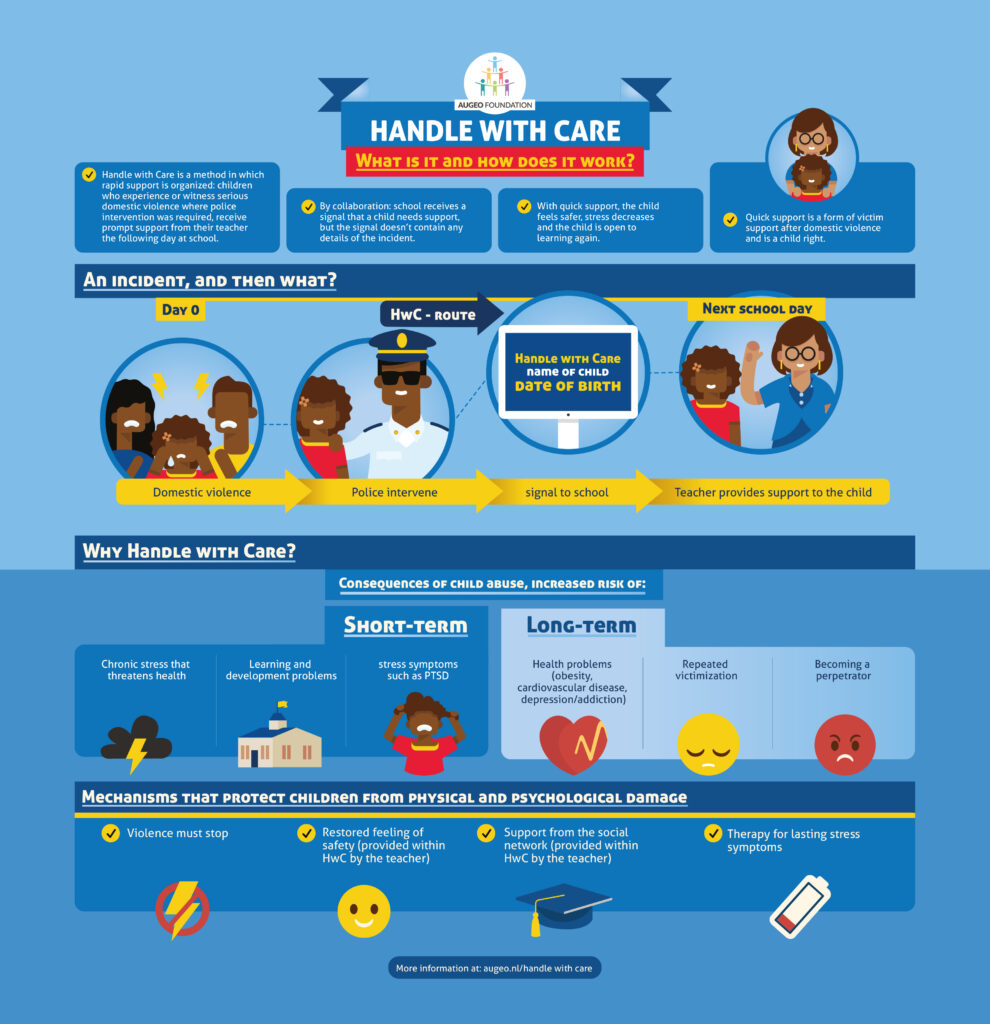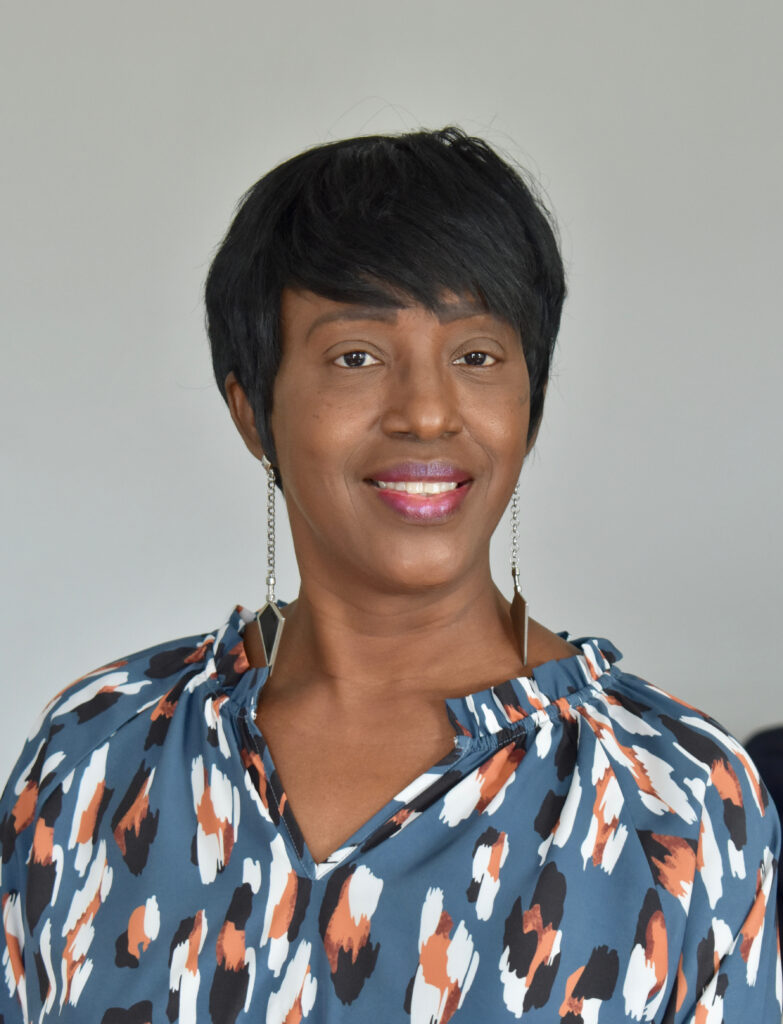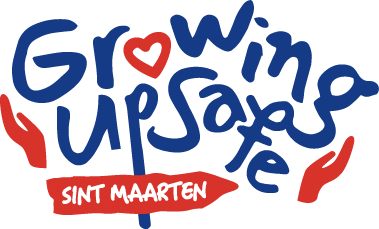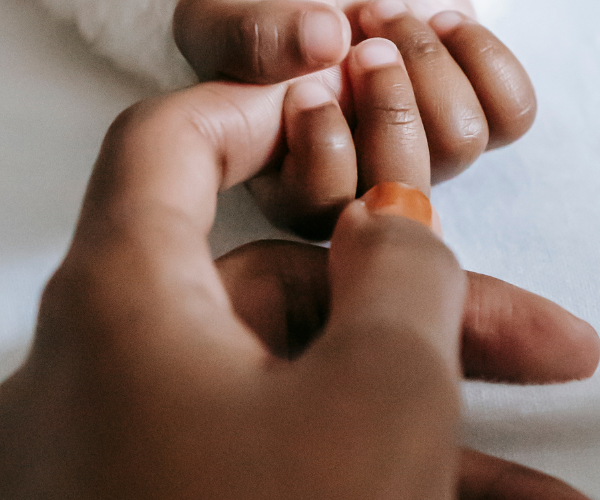How can teachers be informed so that they can better support children in need? The answer is simple: by letting the school know, without giving details about the case. Marga Haagmans (Augeo Foundation in the Netherlands) is convinced that the method Handle with Care can work anywhere, including in Sint Maarten.

Marga Haagmans,
head of Innovation & Research of Augeo Foundation
A police officer in the U.K and his wife, a school director, noticed a gap in child protection. When the police responded to domestic violence incidents involving children, there was no protocol in place to notify schools. Due to this lack of communication, children involved in or witnessing these incidents do not receive the needed support upon their return to school.
Simple solution
Picture a child who has just witnessed violence at home, going to school but their teacher does not know that he or she requires extra attention. Maybe the teacher even reprimands the student for unusual behaviour. This may be understandable if the teacher does not know that the child is going through a difficult time. This does not help the child feel safer or supported – can actually make the situation worse.
Legally a police officer is not allowed to divulge details of a case, so how could the school and its teachers be informed so they can better support children in need? The answer turned out to be quite simple: by letting the school know without sharing details of the case. If the police are called to an incident of domestic violence, with children involved, they can call the school within 24 hours and say: “name of the child + handle with care.”
Changed
“This is what happened in the U.K. and how the Handle with Care program was developed”, explains Marga Haagmans, head of Innovation & Research of Augeo Foundation. “Once we heard about the program and its success, we thought it would be great to bring it to the Netherlands as well.” Marga is part of the team that initiated the program in the Netherlands in 2016. The Foundation aims to ensure that every child can grow up safely in the Netherlands.
“Every child can react differently to experiencing or witnessing violence”
Marga: “Before the program, it could take months, or in some cases it would never reach the school, if a child was witnessing violence at home. This program has really changed that. The police just give a simple signal. The school does not have to know exactly what is going on, all they know is that the child needs support and understanding. Every child can react differently to experiencing or witnessing violence. You might think they would act out violently themselves, and while this can happen, they can also be the quiet kids with no friends – as they have learned to be ‘invisible’.”
Important role
Children experiencing or witnessing violence who do not receive the support they need, can develop issues such as depression, loneliness, learning difficulties, poor health, etc. Later in life they can become aggressors themselves or fall easily into another victim role.
“Teachers have always played an important role in identifying abuse and supporting children. Within the Handle with Care program teachers are trained (if needed) in trauma-sensitive teaching and are asked to provide support to ‘signaled’ students. It can really make a difference for a child to know that someone supports him or her. They realize that they can trust adults, and this changes their worldview. They can become more resilient”, explains Marga.
Easier to talk
Handle with Care was rolled out in 2016 in the Netherlands. Marga and her team saw quick results: “We started in certain communities, including districts where we knew there were a lot of problems. The police and teachers were already familiar with handling sensitive cases. The results were promising right away, even parents got involved. Parents and teachers found it easier to talk about concerns with children. The program started expanding rapidly.
“The results were promising right away, even parents got involved. Parents and teachers found it easier to talk about concerns with children”
As we are growing in the Netherlands, the UK, the US and other countries, we are convinced that this cooperation can work in any country, regardless of culture or (health) infrastructure. Handle with Care has proven to support children in overcoming stress, which is so very destructive for children’s health. We are proud to say that Handle with Care will encompass over 400 schools with an estimated 83.000 students in the Netherlands this year.” Augeo and its partners are now working towards national implementation in the Netherlands, so that rapid support for children who experience serious domestic violence is better guaranteed for all students.
Sint Maarten
The program is also being considered for implementation in St Maarten by the Court of Guardianship and the Child Protection Working Group, to make clear that the safety of children and support for persons that have fallen victim are paramount concerns to the government. Marga supports the idea warmly. “I really think this is a program that could work almost anywhere.”


Police Force of Sint Maarten
‘I think it’s a good idea to let schools know when their students have witnessed a traumatic event’
“When police arrive on the scene with clear evidence of (domestic) violence, an arrest can be made right away. If a report is made after the fact, we first need permission from the prosecutors office to make an arrest. It is important to note that both the victim and witnesses can file a report for a crime such as (domestic) violence. When there are children present and the police are concerned for their safety, the Court of Guardianship is called in.
Adjustments
I think it’s a good idea to let schools know when their students have been part of, or witnessed a traumatic event. This way, the schools’ staff can be sensitive to these children’s needs and support them. At the moment, the schools don’t always know; it can be legally complicated to inform them. This is why I think the ‘Handle with Care’ method is potentially a good programme for Sint Maarten.
“The success of this method also seems dependent on a ‘chain’ of persons, so good teamwork and communication are required”
The method might have to be adjusted to our local realities. All departments are understaffed and our officers work in varied shifts. Everyone involved must understand the benefits of Handle with Care. Once everyone understands the benefits this has for children, they will be motivated to put in the extra work. The success of this method also seems dependent on a ‘chain’ of persons, so good teamwork and communication are required.
Child safety
If made available, I look forward to exploring the possibility of implementing this method on Sint Maarten. In addition, I think a priority should be re(building) a facility where we can place children in an emergency situation and when a child’s safety is in question. This is an essential service that should be available in the child protection system.”
More information:
https://www.augeo.nl/nl-nl/handle-with-care/wat-is-handle-with-care


